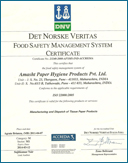|
 |
|
Amasht Hygiene E-news | January 2012 |
|
|
|
|
|
| Helping Schools Ensure Hand Sanitizer Gets Utilized |
|
|
|
Hand sanitizers, while touted as the next best thing when hand washing is not an option, are a sticky situation. Many schools have banned the use of alcohol-based products, while the U.S. Centers for Disease Control (CDC) still promotes their use.
“The Federal Department of Agriculture and the CDC recommend alcohol-based sanitizers with a minimum alcohol content of 60 percent,” says Mark Bishop, vice president of policy and communications with the Chicago–based Healthy Schools Campaign, who recommends BSCs avoid hand sanitizer containing triclosan, an antibacterial/antifungal agent that is a known carcinogen.
There are non-alcohol based products that can be effective, says Steven Brescia, owner of Pure Environment Maintenance Inc., Yonkers, N.Y. These products typically contain the germ-killing, organic agent benzalkonium chloride, used in eye drops and nasal sprays, which, like alcohol, has an efficacy of nearly 100 percent. He says these hand sanitizers remain on hands longer and are easier on children’s sensitive skin.
|
|
|
|
|
|
|
| |
Bishop cautions that while many good non-alcohol hand sanitizers are available, they have not been approved or recommended by the FDA or the CDC, and should be avoided until they are.
Using hand lotions along with hand sanitizers can combat the less comfortable issues arising from alcohol-based products. Limiting hand sanitizer use also can reduce the drying affects of alcohol-based hand sanitizers.
“The concern with alcohol-based products in schools lies with its flammability and risk of inhalation. There is the capacity to abuse hand sanitizers and hand sanitizing stations,” he says. “There have been cases of kids taking the dispensers and throwing them and that becomes a risk. Oversight is necessary because there are physical and environmental risks to hand sanitizers.”
While proper soap and hand sanitizer selection is important, it means little if the student population doesn’t use the products. |
| Article Source: http://www.cleanlink.com/cp/article/Helping-Schools-Ensure-Hand-Sanitizer-Gets-Utilized--13659 |
|
|
|
| |
 |
 |
 |
| |
Every square inch of skin on the human body has about 32 million bacteria on it, but fortunately, the vast majority of them are harmless.
Coughing can cause air to move through your windpipe faster than the speed of sound – over a thousand feet per second! |
|
|
|
|
If you don't want to receive this newsletter, please click on ′unsubscribe′
Amasht Paper Hygiene Products Pvt. Ltd., S.No.23, Thergaon, Pune 411033. email: amasht@vsnl.com www.amasht.com
Please click here if you can′t view the newsletter properly. |
|
|
|
|
|
|